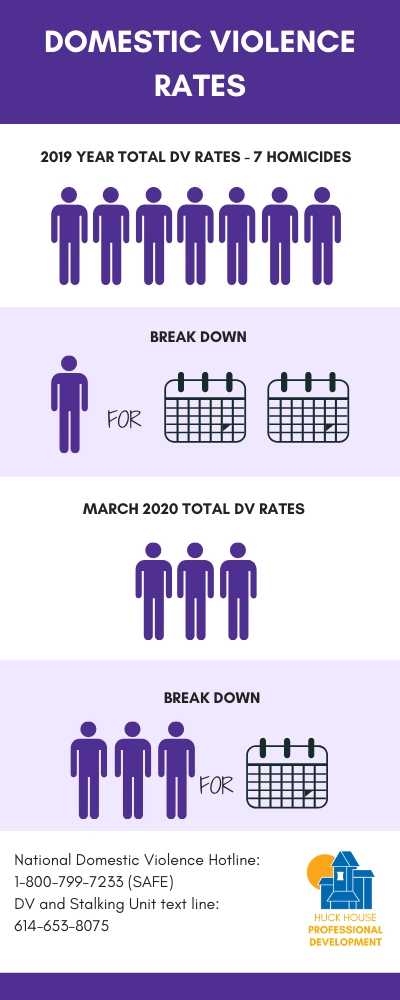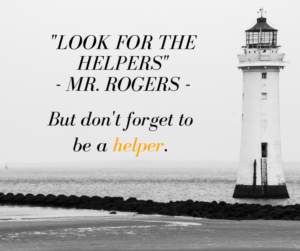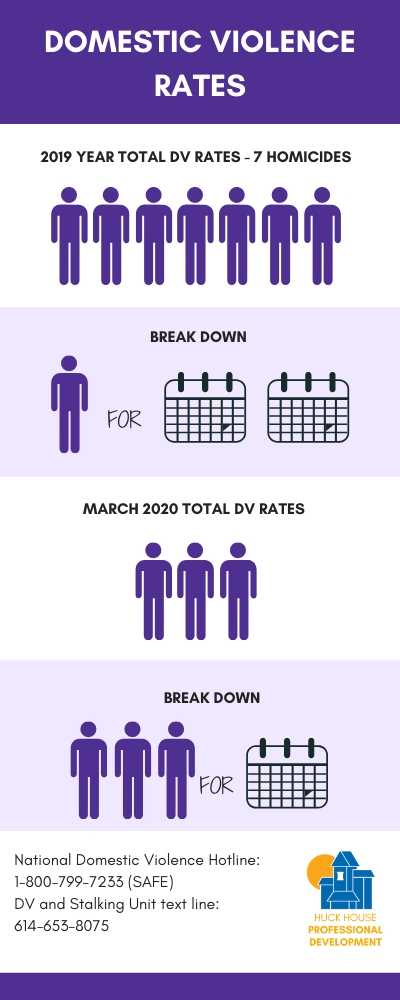Safety Planning Throughout Staying-at-Home
From the Desk of Professional Development

Above are the newest domestic violence related homicide numbers for Franklin County since the start of COVID-19 restrictions. In the first month of COVID-19 restrictions, we have had almost half as many DV related homicides as we did the entire year in 2019. This is a heartbreaking realty of needed safety measures. But a preventable one with the right resources and supports.
Our Professional Development Team sat down with our staff from the VOCA Program, which focuses on helping victim of crimes rebuild their lives. Together, they created a new safety plan worksheet and guidelines for professionals working with youth at-risk for experiencing violence within their home.
What stood out to me about the stats from Klein’s statement is that risk levels and assessments of danger may not be effective right now. People are stuck at home with no outlet for their stress, anxiety, and anger. – Stephanie Smith
What can we do to help?
Below are suggestions and resources for you when working with clients at-risk for in-home violence.
Step 1: Awareness
You’re already doing the first step. You’re seeking out education, support, and building your awareness. Thank you. Keep being amazing.
Step 2: Plan, Plan, Plan
During, COVID-19, abusers are also having more stressors. Less outlets. Less contact with the world. Individuals, society, and healthy coping skills that helped to mitigate the abuse are no longer available, leaving many to spiral. The time to plan is now.
Step 3: Change the way you assess risk
When assessing risk, keep these factors in mind. Evaluate the risk level before, during, and after COVID-19 restrictions to get the most accurate picture.
Stressors are at an all-time high.
Make sure when evaluating risk, you consider that everyone is stressed, uncertain about their future, and lacking outlets for their stress. Try asking for specific examples and behaviors to assess if their partner is engaging in unhealthy communication or is potentially dangerous.
Unhealthy coping skills are unavoidable.
In my personal life, I’ve noticed how much more I rely on unhealthy coping skills, when I am stuck at home. This is an unintended consequence of COVID-19 restrictions. In abusive homes, unhealthy coping skills are often more significant, such as substance misuse, alcohol misuse, or isolation. Adding more risk to their safety.
Risk factors may carry more weight.
Isolation, lack of privacy and lack of resources helps abusers maintain control over their partners. If someone is exposed to COVID-19 or at high-risk, this can add to their partner’s ability to prevent them from getting help.
Nonjudgmental listening.
Sometimes the best thing we can do is listen non-judgmentally. No matter how little or big your life has been impacted by COVID-19, it hurts. It is frustrating. It is scary. It is new. It is uncomfortable. We are hear to listen.
Give survivors an outlet to vent – without their partner knowing.
Techniques, like using a code words help signal when clients are in danger, need assistance, or just need to talk without their partner’s knowledge. Develop a mutual language that both you and the client understand.
Consider being anonymous.
Review your own agency policy about having to identify yourself and when. If possible, consider removing your agency name from your voicemail. Any sites you refer clients to about DV / IPV should have safety features built in to protect them. All of these protect client’s privacy and life by not allowing their abuser to know they are seeking help.
Download our COVID-19 House Plan
Download our Safety Plan Guide to help during COVID-19
Step 4: Look for the Helpers

This is one of my favorite Mr. Rogers quotes. It reminds me how important it is to be someone others turn to for help, but that it’s also okay for me to need help, too.
Step Five: Get support for yourself
Helping clients in unhealthy or abusive relationships is draining. No matter if you have one client or all your clients are in unhealthy relationships, it takes a toll on you. Make sure you are still finding time to take care of yourself.
Support for you might look different
And remember it’s not just your clients that are stuck inside, without their usual routine. You are too! While working in the office, you might have built in time for notes between sessions or taken breaks to chat with co-workers. These breaks might have transitioned with you to working at home or remained at the office. Challenge yourself to build activities that re-charge you back into your routine.
Self-Care Ideas
These are not just good for you, but also good for your children to watch and embrace themselves.
Try taking a walk after your meeting.
Do a meditation exercise in between sessions.
End your day with a Ted Talk.
Take time for you instead of jumping right back into your personal life.
Helpful Links to Check Out
ODVN Updated Trauma Informed Approaches Manual
SAMSHA Intimate Partner Violence Resources
COVID-19 Free Counseling Resources


